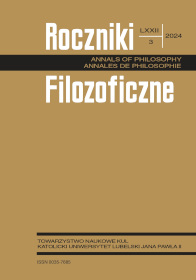Spinoza on Envy and the Problem of Intolerance
Spinoza on Envy and the Problem of Intolerance
Author(s): Keith GreenSubject(s): Philosophy, History of Philosophy, Social Philosophy, Early Modern Philosophy
Published by: Towarzystwo Naukowe KUL & Katolicki Uniwersytet Lubelski Jana Pawła II
Keywords: envy; hate; superstition; intolerance; affects
Summary/Abstract: In this paper, I examine Spinoza’s account of envy (invidia) with specific attention to his con-sistent remarks about envy in the context of “superstition” — how “superstition” amplifies envy as an affect, that along with fear and ambition, motivates intolerance. Spinoza counterposes his methodological commitment to view the affects, on a “geometric” model, to Aristotelian and scholastic accounts, and to Descartes’ Passions of the Soul. But they inform his account of the relationship between envy, esteem (gloria), pride (superbia), self-depreciation (abjection), and ambition (ambitio). Spinoza argues that envy just is a form of hate, it encompasses both sadness at another’s good, but joy at others’ misfortune, and he regards it as evil, even though he refuses to describe it as a vice. Within his methodological framework, it is a consciousness of weakness with an idea of others’ good as the cause. This accounts for its amplification by “superstition”, and its role in motivating ambition and intolerance. I focus, in particular, on the implications of Spinoza’s discussion for tolerance of moral disagreement and difference.
Journal: Roczniki Filozoficzne
- Issue Year: 72/2024
- Issue No: 3
- Page Range: 35-67
- Page Count: 33
- Language: English

